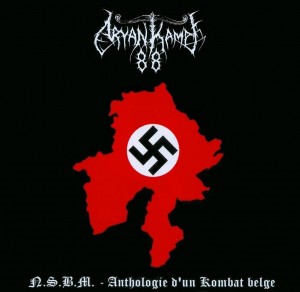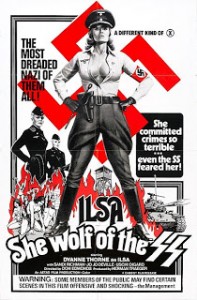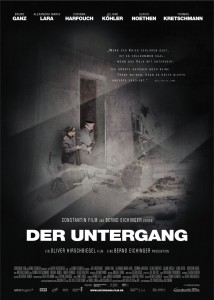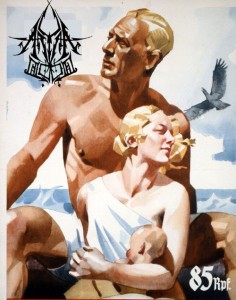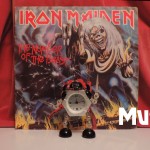 It’s not National, to my knowledge it’s rarely socialist, but it mostly is black metal; National Socialist Black Metal (hereafter, NSBM) annoys people by being ‘too evil’, or at least evil in the wrong way. As the snuff movie is to the horror movie, it seems, NSBM is to BM. There are a couple of flaws in this analogy; firstly, it suggests that black metal in general is, like horror movies, some kind of fantasy (which it certainly often is, but isn’t necessarily) and secondly, that NSBM isn’t some kind of fantasy (see previous parentheses). The Nazis of World War 2 represent the ‘ultimate evil’ to people of the post-war generations because whereas even the worst serial killers of the 20th century ‘worked’ on an individual, localised scale, the Nazis made murder into an ideology and ultimately an industry. That is, they functioned in ways that are relevant and relate-able to the daily lives and experiences of most people; but in bringing that mundane quality to extermination; ‘death factories’ they ultimately created something more frightening than a lone maniac. So is Nazi black metal the embodiment of that famously banal evil and therefore the ultimate in musical terrorism? Hmm, possibly not but let’s see…
It’s not National, to my knowledge it’s rarely socialist, but it mostly is black metal; National Socialist Black Metal (hereafter, NSBM) annoys people by being ‘too evil’, or at least evil in the wrong way. As the snuff movie is to the horror movie, it seems, NSBM is to BM. There are a couple of flaws in this analogy; firstly, it suggests that black metal in general is, like horror movies, some kind of fantasy (which it certainly often is, but isn’t necessarily) and secondly, that NSBM isn’t some kind of fantasy (see previous parentheses). The Nazis of World War 2 represent the ‘ultimate evil’ to people of the post-war generations because whereas even the worst serial killers of the 20th century ‘worked’ on an individual, localised scale, the Nazis made murder into an ideology and ultimately an industry. That is, they functioned in ways that are relevant and relate-able to the daily lives and experiences of most people; but in bringing that mundane quality to extermination; ‘death factories’ they ultimately created something more frightening than a lone maniac. So is Nazi black metal the embodiment of that famously banal evil and therefore the ultimate in musical terrorism? Hmm, possibly not but let’s see…
Defining NSBM
Let me be clear; I am not discussing heathen/pagan/ or folk black metal that may or may not be perceived to have a Nazi angle to it. Interesting though that scene is (Graveland is the classic example of a sometimes great band whose career has been blighted by the media’s – and the band’s own – inability to differentiate between history and ideology) the term ‘Nazi’ is too specific and anachronistic to be very useful when discussing paganism, heritage etc even though the Nazis loved that stuff. So, here I am more concerned with bands whose work fully intends to glorify that specific NS ideology, and whose output can be represented by artwork like this:
The first question is, is NSBM any good? Just like any black metal, the answer is sometimes yes and sometimes no. On occasion, the marriage of the classic sound of ‘orthodox black metal’ with the particular (let’s not beat around the bush, violently racist and specifically anti-Semitic) kind of extreme bile that a Nazi band projects can be extremely effective. Even a modestly-talented middle-of-the-road orthodox BM band like Poland’s Ohtar were able to make something nightmarishly gripping out of tunes that, had they been devoted to Satan, would have just been that familiar, same old tired BM. In that (but not only that) respect, NSBM is comparable to Christian Black Metal – it may sometimes be okay as sound or music, but that doesn’t make it right.
 Given the existence of such subgenres as ambient BM and folk BM, perhaps the only essential ingredient of black metal is Satanism, in one form or another; and the good thing about Satanism is that it can mean many things to many people. Therefore you have the kind of religious goats ‘n’ horns Satanism that is the polar opposite of Christian metal, exemplified I guess by Watain. Related, but not necessarily requiring any actual religious belief, there is the mythical figure of Lucifer – the fallen angel, analogous to humankind, who were also cast out of paradise for rebelling against God’s stricture. Lucifer as the cosmic light-bringer with the key to forbidden knowledge. As the philosophical figure of the adversary, Satan can simply be seen as the ultimate rebel; and therefore the perfect icon for black metal regardless of one’s feelings about Christianity or goats.
Given the existence of such subgenres as ambient BM and folk BM, perhaps the only essential ingredient of black metal is Satanism, in one form or another; and the good thing about Satanism is that it can mean many things to many people. Therefore you have the kind of religious goats ‘n’ horns Satanism that is the polar opposite of Christian metal, exemplified I guess by Watain. Related, but not necessarily requiring any actual religious belief, there is the mythical figure of Lucifer – the fallen angel, analogous to humankind, who were also cast out of paradise for rebelling against God’s stricture. Lucifer as the cosmic light-bringer with the key to forbidden knowledge. As the philosophical figure of the adversary, Satan can simply be seen as the ultimate rebel; and therefore the perfect icon for black metal regardless of one’s feelings about Christianity or goats.
Misanthropy: a group activity?
Some of the best black metal, even made by those with Nazi links (Burzum being the best and most obvious example) is metaphysical and above all personal. Like any music that people put their souls into, black metal isn’t ‘just music’ – and no-one could deny that in the early 90s, people like Dead or Mayhem or Burzum’s Varg Vikernes lived the music they made. Whatever his political views were or are, Vikernes has the sense to realise that, while his views may be shared by many, his thoughts and feelings are his alone and at its best, Burzum’s music is an expression of those feelings rather than an ideology. Filosofem, probably his finest work, expresses a kind of solitary desolation through lyrics that are almost abstract in their elemental bareness, making it endlessly appealing to those metal fans (and not just metal fans) who feel alienated from modern urban society and mainstream music.
As an alternative (or even an accompaniment) to this kind of individualistic ‘Satanic’ philosophy, National Socialism is highly inadequate. It’s too specific, too political, too ephemeral, too small. Anyone reading Mein Kampf can have no doubt that, to Adolf Hitler, National Socialism was the expression of a deeply felt personal philosophy. But anyone following it now should be aware that that’s exactly what they are doing – following someone else’s ideology, living someone else’s dream. Not to be too dictatorial about it, but surely even though black metal isn’t all that some of its proponents make it out to be, following a failed idea from the recent past is fundamentally not what the genre is supposed to be about.
 Another key band that helped to ignite the idea of NSBM while definitely not belonging to it were Darkthrone, but as is obvious from looking at their work, their brief flirtation with the language of NS, even evaluated from a politically neutral point of view, undermined the impact of their music. The album which caused the controversy is also the one which cemented the band’s reputation as scene leaders, despite the fact that it is significantly weaker than the two which preceded it; 1993’s Transilvanian Hunger. The title track is one of the band’s – and the genre’s – best ever songs, but it also helps to illustrate where Darkthrone went wrong. The (not surprisingly) vampiric lyrics are classic black metal, an almost romantic view of misanthropy, forever making cold one of the keywords of the genre. The narrator is utterly divorced not only from society but from humanity. And yet, at the same time as putting forward this image of inhumanity/antihumanity, the band chose, famously, to include the statement Norsk Arisk Black Metal (‘Norwegian Aryan Black Metal’) on the album’s sleeve. What the Aryan (Iranian, or Indo-European or however you choose to interpret the word ‘Aryan’) people have to do with Norway is anyone’s guess. And if we are to presume that the vampire of Transilvanian Hunger believes in some kind of racialist ideology it can surely only undermine the song with baggage it definitely doesn’t need. Which raises another problem with National Socialist ideology in relation to BM; it’s too nice.
Another key band that helped to ignite the idea of NSBM while definitely not belonging to it were Darkthrone, but as is obvious from looking at their work, their brief flirtation with the language of NS, even evaluated from a politically neutral point of view, undermined the impact of their music. The album which caused the controversy is also the one which cemented the band’s reputation as scene leaders, despite the fact that it is significantly weaker than the two which preceded it; 1993’s Transilvanian Hunger. The title track is one of the band’s – and the genre’s – best ever songs, but it also helps to illustrate where Darkthrone went wrong. The (not surprisingly) vampiric lyrics are classic black metal, an almost romantic view of misanthropy, forever making cold one of the keywords of the genre. The narrator is utterly divorced not only from society but from humanity. And yet, at the same time as putting forward this image of inhumanity/antihumanity, the band chose, famously, to include the statement Norsk Arisk Black Metal (‘Norwegian Aryan Black Metal’) on the album’s sleeve. What the Aryan (Iranian, or Indo-European or however you choose to interpret the word ‘Aryan’) people have to do with Norway is anyone’s guess. And if we are to presume that the vampire of Transilvanian Hunger believes in some kind of racialist ideology it can surely only undermine the song with baggage it definitely doesn’t need. Which raises another problem with National Socialist ideology in relation to BM; it’s too nice.
Nazism is too nice
This statement clearly needs elaboration. Misanthropy, whether or not it is a viable design for life, is all-encompassing. Nazism is by definition unpleasant, but – examining even the term ‘National Socialism’ – it most cannot be said to be anti-social (there’s no nationalism without nations, no socialism without society), let alone misanthropic. Therefore NSBM, although at first it may seem to our edgelord brethren like the ne plus ultra of darkness, actually has a reductive effect compared to the stance of the classic ‘second wave’ of BM. As a misanthrope, you can’t ‘belong’, but to be a member of some kind of elite society, you must ‘belong’. Sweet, really.
The Inclusiveness of true evil?
Black metal’s classic stance is that it supports ‘all the darkness of humanity.’ Variations of that dedication have appeared on album sleeves since the dawn of the 90s and are still going strong; a recent one in my own experience being Malaysian band Nefkarata’s (very good) Morts, which is dedicated to “All Evil In Man.” “All evil” by necessity includes Hitler & co, alongside Jewish serial killer David Berkowitz, Roman emperor Caligula, Idi Amin, the Moors murderers, Margaret Thatcher etc; a position of strength, if you’re into that kind of thing. But the most strident NS bands are so dedicated to that vague, misunderstood thing, ‘Aryanism’ that basically their ideology all about one short, albeit turbulent, period of the 20th century. And for all the true NSBM bands’ xenophobic, elitist rhetoric, it should be remembered that historically, Nazis were not only mainly Germanic – NSBM bands are as or more likely to spring from North or South America or Finland or Poland as anywhere else – but they were also – and for a totalitarian ‘might-is-right’ philosophy this is extremely important – the losers.
The glamour of atrocity
Like it or not, it’s undeniable that Nazism and especially the holocaust, have a certain frisson; hence the existence of cheesy Nazi exploitation movies like Salon Kitty, Ilsa, She-wolf of the SS and slightly more ambitious/artistic ones like The Night Porter.
Awareness of this frisson is at the heart of one of Stephen King’s better pieces of writing; the opening chapters of Apt Pupil, and a disapproving awareness of it drove the predictable moral panic which greeted Martin Amis’ deeply non-exploitative Time’s Arrow. That frisson, that special atmosphere is definitely part of the allure of certain kinds of NSBM. Especially the sillier kind that’s made by bands with ‘Aryan’ in their name. An album cover that features a photograph of Nazi atrocities with a typically spiky black metal logo has a kind of spurious impressiveness that makes it stand out amidst the hordes of unreadable scrawls, inverted crosses, enthroned goats etc. It’s pointless to deny that appeal because, much are there are plenty of NSBM fans who are convinced Nazis, there are probably more that just think it’s transgressive and edgy and therefore cool.
“Nazi Moods”
Perhaps the most artistically successful Nazi-themed or related black metal is the ambient kind. Partly that’s because – however unappetising it may sound from a pop-music perspective – the mixture of sombre, wintry and minimalist electronica with martial themes and archive recordings of WWII-era radio broadcasts, speeches and music is incredibly evocative and paradoxically, strangely emotionally involving just because of its atmosphere.
Similarly, the kind of artwork that accompanies these releases tends to be evocativ e rather than visceral. Black and white photographs of landmarks like the Berghof, Zakupy Chateau, Schlöss Wewelsburg, the Wolf’s Lair; crumbling monuments, statues or ruins. This kind of aesthetic has a deep appeal which matches the music – boring if you don’t like it, but strangely moving if you do, even for those who completely reject the ideology behind it. Compared to standard NSBM, this is a very grey area; whereas a record with a cover image of a mountain of emaciated corpses and a name like ‘Aryan Sturm’ can be reasonably presumed to be an NSBM album, a masterpiece like Kampf by the Italian ‘electro-apocalyptic’ group Tronus Abyss – which has many of the hallmarks of an NS ambient project as listed above, cannot (and shouldn’t) be easily labelled NSBM. The band does explore avenues of mysticism associated with the Third Reich, they do use martial themes and evoke the ruins of postwar Europe, but it would be difficult (and futile) to try to demonstrate that therefore Kampf is a ‘Nazi album’, any more than Oliver Hirschbiegel’s superb and similarly evocative Der Untergang is a ‘Nazi film’.
e rather than visceral. Black and white photographs of landmarks like the Berghof, Zakupy Chateau, Schlöss Wewelsburg, the Wolf’s Lair; crumbling monuments, statues or ruins. This kind of aesthetic has a deep appeal which matches the music – boring if you don’t like it, but strangely moving if you do, even for those who completely reject the ideology behind it. Compared to standard NSBM, this is a very grey area; whereas a record with a cover image of a mountain of emaciated corpses and a name like ‘Aryan Sturm’ can be reasonably presumed to be an NSBM album, a masterpiece like Kampf by the Italian ‘electro-apocalyptic’ group Tronus Abyss – which has many of the hallmarks of an NS ambient project as listed above, cannot (and shouldn’t) be easily labelled NSBM. The band does explore avenues of mysticism associated with the Third Reich, they do use martial themes and evoke the ruins of postwar Europe, but it would be difficult (and futile) to try to demonstrate that therefore Kampf is a ‘Nazi album’, any more than Oliver Hirschbiegel’s superb and similarly evocative Der Untergang is a ‘Nazi film’.
Banning Nazism; the ultimate irony
In recent times, the escalating paranoia about right-wing extremism (alongside, ironically or maybe obviously, a tolerance among people for actual right-wing extremism) has led to some high-profile cases of black metal bands being prevented from playing live, especially in Germany. Most of these bands have of course not been Nazis at all – and it is intolerable that these bands have had their art suppressed and livelihood threatened over what is basically the same kind of metal-phobic ignorance that led to US burnings of Number of the Beast in the early 80s. On the other hand, being provocative provokes, and there’s something a little bit embarrassing about people whose whole schtick is being scary and offensive getting annoyed because their work had its intended effect.
Still, banning any kind of art that doesn’t actually involve harm to third parties is a ridiculous, futile gesture which has (to my knowledge) never had any positive results except to energise those opposing the regime in charge. On the other hand, the last people who should be complaining are actual NS bands. In fact, they should be quite pleased; banning is a classic Nazi trait after all, and it should give them hope for the future of the reich.


